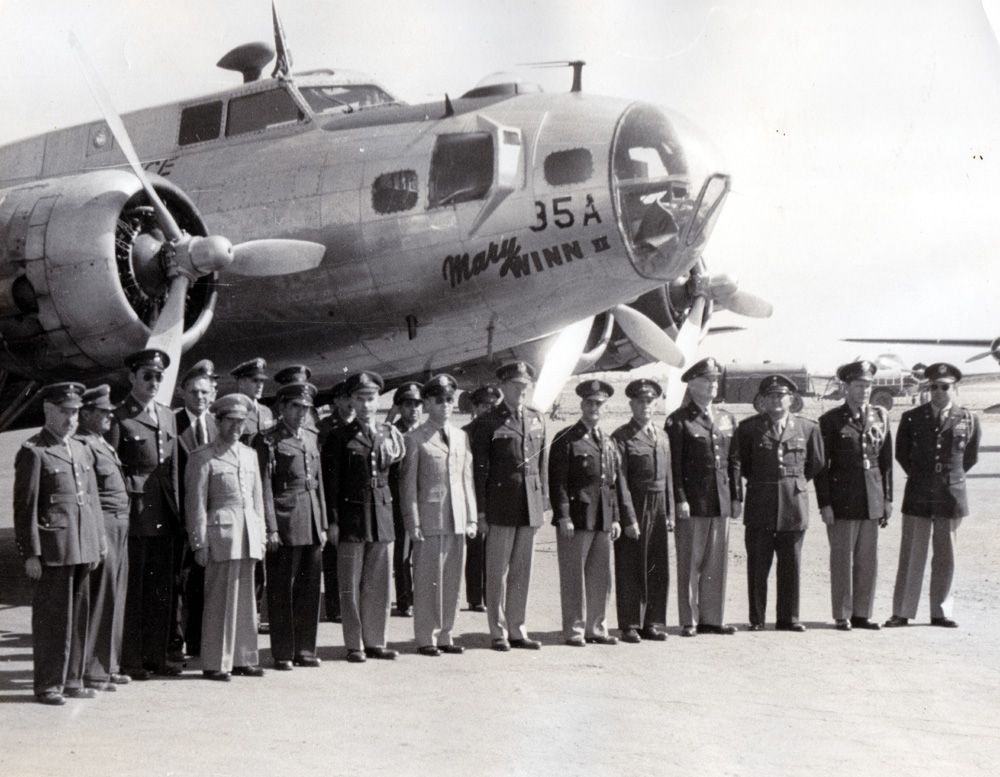
And one for the experts. "Mary Winn"
-
Dan Johnson
- Posts: 296
- Joined: Tue Dec 26, 2006 1:14 pm
- Location: Rosemount, Minnesota
-
aerovin2
- Site Admin
- Posts: 899
- Joined: Sun Aug 01, 2004 9:03 pm
- Location: Lincoln, California
- Contact:
Re: And one for the experts. "Mary Winn"
Please, please, post away. I think I have something on this airplane but need to check my file later....
Scott Thompson
Aero Vintage Books
http://www.aerovintage.com
"The Webmaster, More or Less"
Aero Vintage Books
http://www.aerovintage.com
"The Webmaster, More or Less"
-
Steve Birdsall
- Posts: 411
- Joined: Sat Nov 03, 2007 10:46 pm
- Contact:
-
aerovin2
- Site Admin
- Posts: 899
- Joined: Sun Aug 01, 2004 9:03 pm
- Location: Lincoln, California
- Contact:
Re: And one for the experts. "Mary Winn"
Mary Winn II was B-17G 44-8990, renown particularly because it was the (then) CB-17G that was assigned to transport Winston Churchill and party on his U.S. tour in February 1946, the one in which he made his "Iron Curtain" speech. Had to be a bit of cramped traveling for the party. The B-17G went on to service as a VB-17G, was sold civil in 1959 (for $5,111), and became N3678G. It enjoyed short use as an air tanker before being destroyed in October 1962 while working a fire near Fallon, Nevada.


I did an article for FlyPast magazine published way back in November1994. Richard Fitzhugh, aged 21 at the time, was the pilot of the airplane while it was assigned for Churchill's use. The name Mary Winn II came from General Frederick Anderson, to whom the airplane was first assigned in 1945 or 1946, after his daughter. 44-8990 was primarily assigned to Bolling Field near Washington, D.C. for its military service.
The "35 A" or "85 A" dates the photo in the original posting as at a different time, and the end of what appears to be the "U.S. Air Force" marking on the fuselage abeam the wing would suggest a 1950s time frame. It was probably assigned to a general for transport at the time of the photo as the setting would suggest.
Why does the nose number look like it was painted on before the cheek window was added?


I did an article for FlyPast magazine published way back in November1994. Richard Fitzhugh, aged 21 at the time, was the pilot of the airplane while it was assigned for Churchill's use. The name Mary Winn II came from General Frederick Anderson, to whom the airplane was first assigned in 1945 or 1946, after his daughter. 44-8990 was primarily assigned to Bolling Field near Washington, D.C. for its military service.
The "35 A" or "85 A" dates the photo in the original posting as at a different time, and the end of what appears to be the "U.S. Air Force" marking on the fuselage abeam the wing would suggest a 1950s time frame. It was probably assigned to a general for transport at the time of the photo as the setting would suggest.
Why does the nose number look like it was painted on before the cheek window was added?
Scott Thompson
Aero Vintage Books
http://www.aerovintage.com
"The Webmaster, More or Less"
Aero Vintage Books
http://www.aerovintage.com
"The Webmaster, More or Less"
-
Dan Johnson
- Posts: 296
- Joined: Tue Dec 26, 2006 1:14 pm
- Location: Rosemount, Minnesota
Re: And one for the experts. "Mary Winn"
Interesting to note the difference in markings. No sign of the AIR FORCE or what looks like a light behind the cockpit, in the lower photo. So was the photo I posted taken before or after? And it does look like the window was added after the number was painted. Strange